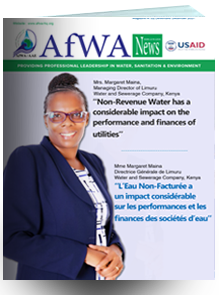
Non-Revenue Water has a considerable impact on the performance and finances of utilities
Our focus today is on Kenya where we meet Ms. Margaret Maina, who for the past 15 years has skilfully managed one of Kenya’s 112 water utilities, the Limuru Water and Sewerage Company (LWSC), incorporated in March 2006 under the Companies Act and wholly owned by the Kiambu County Government, one of Kenya’s 47 devolved governments.
My Name is Margaret Maina from Kenya. I am the Managing Director of Limuru Water and Sewerage Company with 15 years in this Position. I Have a Masters Degree in Public Health with a Major in Epidemiology and Disease Control (Kenyatta University) and a Bachelor of Philosophy in Technology (Applied Biology) Technical University of Kenya( TUK). I have worked in various Water Sector institutions with over 27yrs experience in Water Supply Management, Water Quality Surveillance and Pollution Control. I am currently working in sanitation with particular interest in the pollution control measures to Nairobi rivers.
‘‘To meet people need is my priority’’
The water access at National level is at 58% for the regulated water service providers. For our Company, the service levels are at 63% while the areas we are not serving are served by 12 community water projects in the rural areas. The company serves Limuru Town,4 Urban Centres and Rural areas with a population of 128,000 people. Our Water sources are Surface water and 2 Water treatment plant with a total of 85 staff. Customer service is key where the service charter makes sure that the needs of the customers are met. A motivated workforce and prudent use of financial resources ensures that satisfy the needs of our population.
‘‘Non-Revenue Water has a considerable impact on the performance and finances of utilities’’
Non-Revenue Water is a challenge to many including our Company. We have set a NRW-unit and equipped it with relevant equipment for leak detection, ultrasonic flow meters and modern meter testing bench. Use of quality water meters has made sure accurate volumes are billed. We have put in place the following strategies. (1) DMA Creation. To be able to monitor daily flows for every zone and narrow down to zones with highest losses. (2) Night flow measurements- to differentiate the amount of physical losses and commercial losses per DMA. (3) Meter relocation. (4) Meter servicing, testing and meter replacement (5) Leak detection (6) For commercial losses, have a new billing system with GIS component for customer identification on the ground and customer care component for reporting and response time to customer needs. (7) Meter reading using phones integrated with the billing system and the technical component and reporting of leaks and bursts
‘‘Women leaders and managers at the decision-making tables’’
There are few women managers in the Water sector which is highly technical. This means there are few women leaders at the top and therefore difficult to drive women agenda in many aspects where their needs are not met. An example is a case where you find in most water and waste water treatment plants, you may find there are no toilets for women and where they are available, they are not sanitary compliant to meet the women needs. In the designing of infrastructure like tanks etc, you find the ladders are not women friendly and this makes it difficult for the women engineers to climb for inspection of the works. These issues can only be sorted out when we have women leaders and managers at decision making tables where most of the times, since women are the one who carry the burden of water scarcity, they are part of the agenda.
In this regard, I am very happy that AFWA is support women in the water and sanitation sector. I am a founder member of Kenya’s Women in Water and Sanitation (WIWAS) which was launched in 2016 along the AFWA congress in Nairobi. This is a great step in creating a platform for women to take their space in the sector and what is now required is strengthening the networks to achieve their mandates.
My expectation is that many women leaders will be engaged in different platforms especially for mentoring the young women professionals as a preparation for leadership positions and also for succession purposes. I also expect that a fund for women network is put in place for financing women activities without the reliance of the water utilities for the networks to be functional in their strategic plans.
By Mrs. Margaret Maina
Managing Director of Limuru Water and Sewerage Company, Kenya

 English
English  Français
Français 